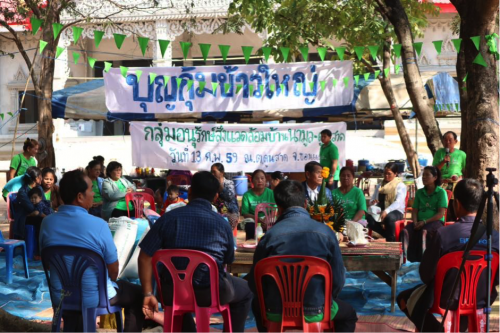KHON KAEN – On February 13, a local environmental group that opposes gas exploration sites in Khon Kaen and Kalasin provinces convened activists to protest ongoing gas drilling operations, which villagers believe make them sick. The event, which contravenes the Thai government’s ban on public assembly, followed protests that gained national attention last year after state security forces were deployed in the area to assist the gas drilling company under fierce opposition by the affected communities.

In the all-day event, the Namun-Dunsat Environment Conservation Group marked the first anniversary of their protest against gas drilling operations in Khon Kaen and Kalasin provinces. Activists from the region joined the event to step up villagers’ battle against the company and the government.
Villagers from two local communities, both which allege they suffer from gas-related dizziness and breathing problems, met with one of the country’s most politically active student groups, Dao Din, in an effort to step up their fight against drilling in the area. After a traditional Isaan ceremony, activists from the region discussed strategies to continue their battle against the company and the state.
Also present were representatives from the Thai Lawyers for Human Rights Center (TLHR), the Community Resource Centre Foundation, and the Udon Thani Environment Conservation Group, which is currently fighting a new potash-mining project in Udon Thani.
The local conservation group “Namun-Dunsat” held the meeting to voice opposition to a petroleum production concession for the Dong Mun gas field, which covers 31.9 square kilometers, straddling the border between Khon Kaen and Kalasin. Apico (Khorat) Limited, an American company, secured the land in August 2012 for a gas field expected to contain gas reserves of 96 billion cubic feet.
If Dong Mun gas field moves into operation, it will supply a refinery plant in Nong Kung Si District in Kalasin, as well as a liquefied and compressed natural gas production plant in Khon Kaen’s Kranuan District, which is planned to be operational in 2017.
Villagers and activities contend that fracking, a high-pressure injection of water, sand and chemicals, can cause water pollution that eats away at crops and spurs illness among locals. Apico denies fracking in the region, but documents on their work reveal that fracking has indeed taken place.
The event marked the first anniversary of the villagers’ protest movement, which gained momentum in February 2015 when Apico (Khorat) Limited moved drilling equipment to Kalasin’s Tha Khantho District. Hundreds of villagers in Kranuan District attempted to block the way to the drilling site but about 200 state security forces assisted the company’s trucks in passing through the crowd of kneeling protesters.
Dr. Niran Pitakwatchara, National Human Rights Commissioner at that time, criticized the use of force against the village protesters and logged a complaint with the Khon Kaen governor and the chief of the Second Army Area. The NHRC also issued a complaint to the Thailand’s Office of the Ombudsman last year, but the central government agency quickly dismissed it.
According to an Energy Ministry expert, the gas site could help to increase the country’s energy independence and the company’s operations would generate 188 billion baht in state royalties.
However, the Namun-Dunsat Environment Conservation Group opposes the drilling and gas production operations, as they fear chronic illnesses caused by hydrogen sulfide gas leakage and possible contamination of groundwater sources, which could damage their crops and threaten their livelihoods.
The group says that the company’s Environmental Impact Assessment (EIA) process was conducted without genuine public participation. Instead of asking for local consent, Apico allegedly handed out small gifts to villagers, like t-shirts and tote bags, and asked villagers to sign for receiving the souvenirs.





